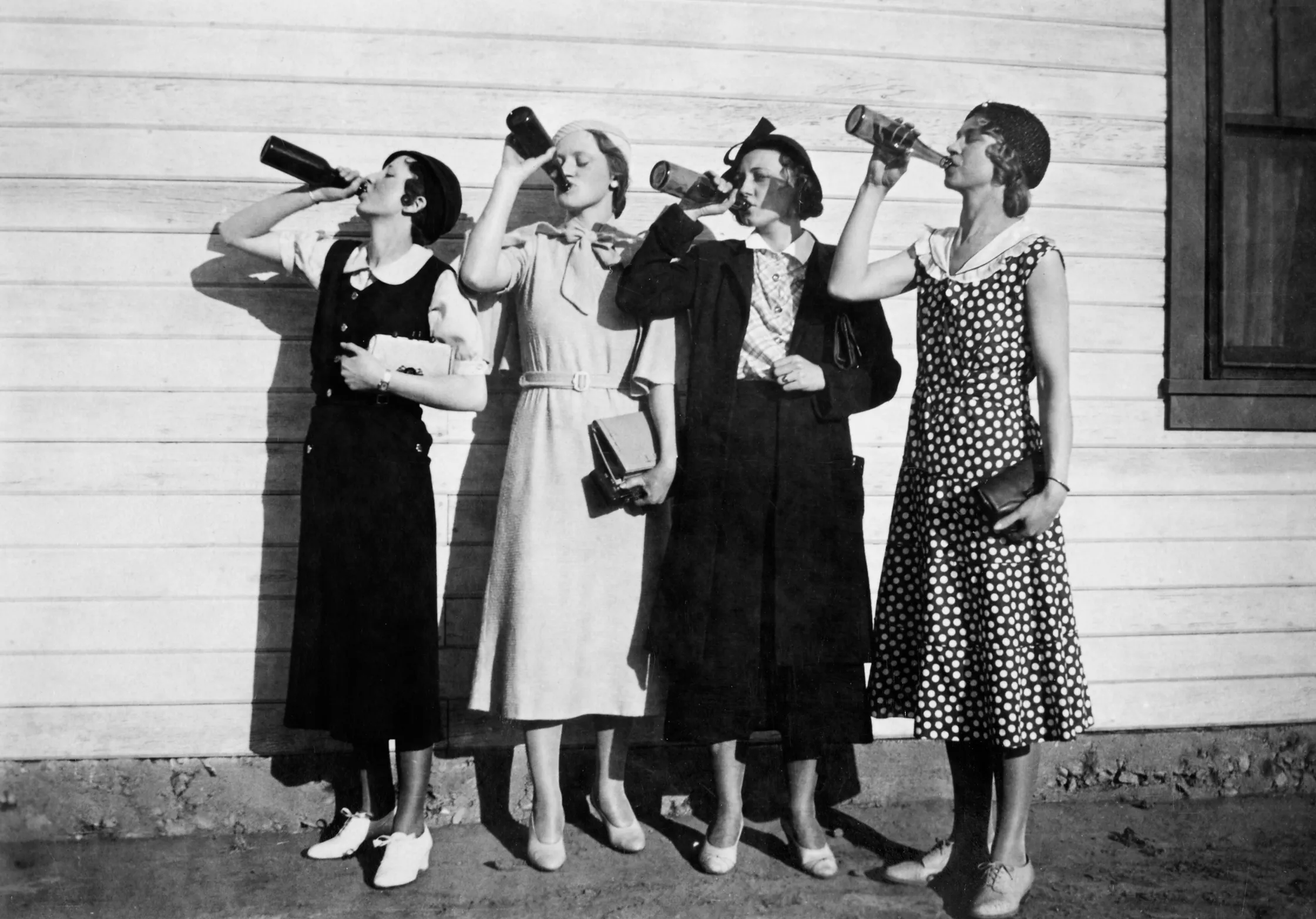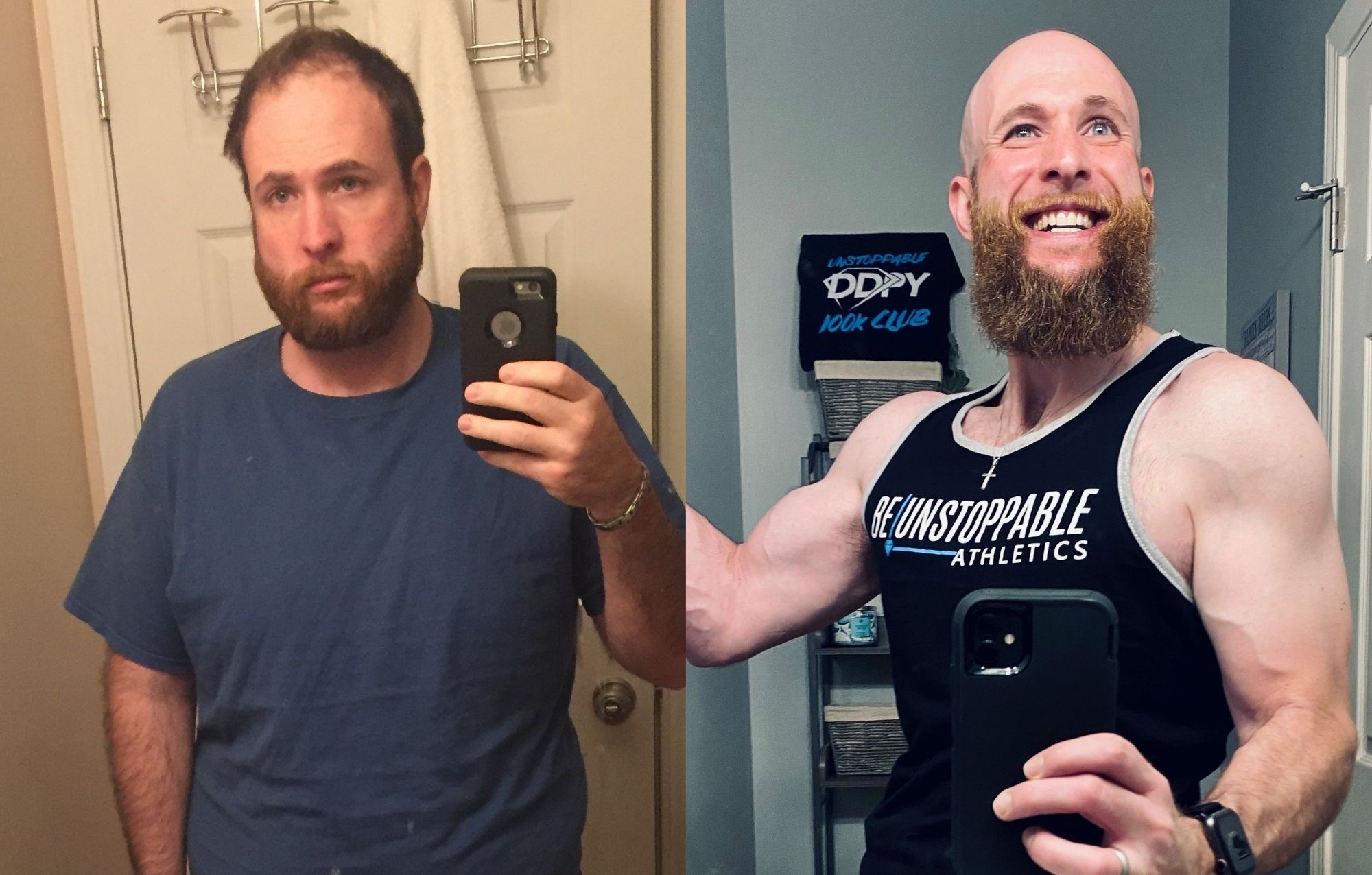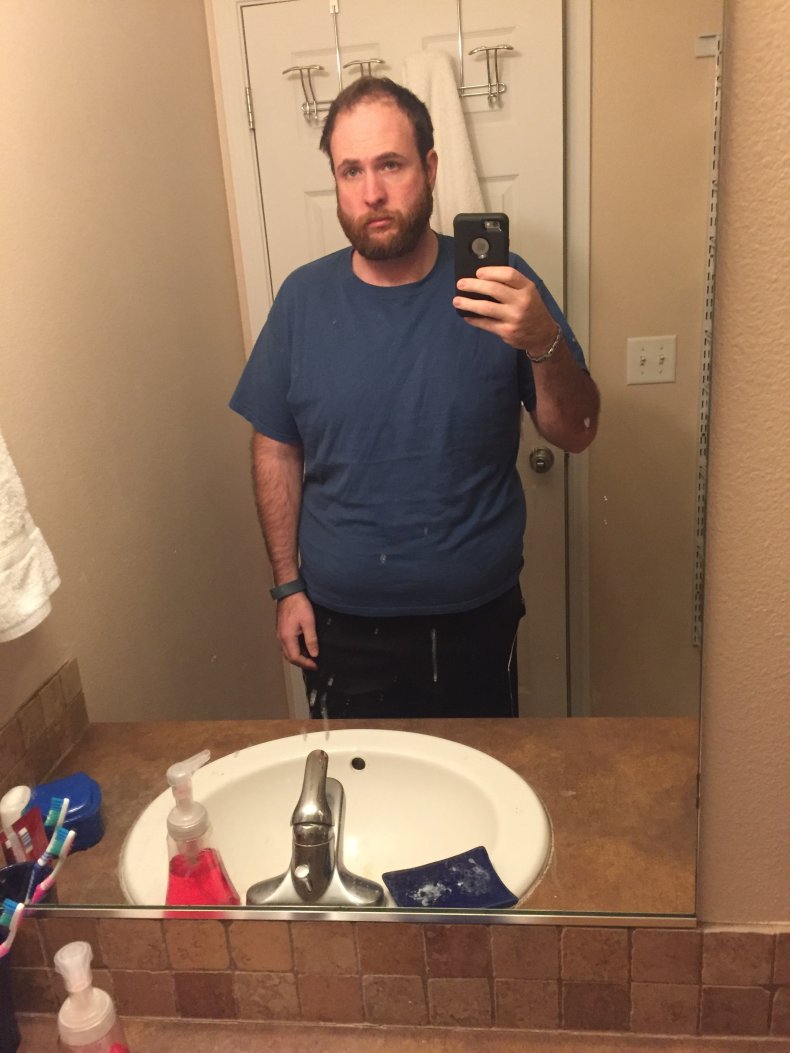Here’s What Happens When You Stop Drinking
What happens when you stop drinking alcohol? Pretty much everything you’d expect—and also plenty that you might not.
Like, better sleep, less anxiety, and a clearer head, for one. And, glowier skin, hotter sex, and maybe even more connected relationships as well. But that’s not all: Recent studies show that the list of social, psychological, and physical benefits of teetotaling is ever-growing. It includes everything from more balanced hormones to a stronger immune system to reduced risks of heart disease, liver disease, and cancer. Plus, the potential of increased self-awareness, self-confidence, and higher self-esteem, too. As one doctor I recently interviewed put it, when you quit alcohol, “your entire body and soul improves.”

But swapping our evening glass of red wine for non-alcoholic spritzes and mocktails isn’t always super easy to do—even if you don’t officially struggle with an alcohol use disorder. That’s because alcohol is literally everywhere; its consumption is ingrained in our culture and societal norms. “Alcohol is the only socially-accepted mind-altering beverage in the world,” says Dr. Rafaat Girgis, a triple-board certified psychologist and the medical director at Moment of Clarity, a mental health treatment center in Orange County, California. “It’s served at parties, during meals, and on holidays; for most people, it’s just a part of daily life.” Which is why taking even just a short break for Dry January or Sober October—not to mention, quitting long-term—can often feel like it requires heroic levels of discipline.
One way to make it all a little easier: having a firm understanding of when you can expect to experience all the benefits. Anticipating everything that can occur after one day, one week, one month, and beyond can help you stay connected with the positive changes as they unfold— and remind you to give yourself some grace when temptations emerge. “Getting your body back to normal functioning depends on many factors, including your gender, current health, and your willingness,” explains Dr. Girgis. “Accept it, learn, and gain insight as you go.” After all, the body and the soul don’t improve overnight.
To that end, it’s also important to stay patient—and persistent. Good advice for any challenging situation, really, and especially when it comes to cutting back on or quitting alcohol. Tanya Mezher, a certified dietary nutritionist and the founding practitioner at functional medicine platform Malla agrees. “Recovery takes time, and setbacks may occur,” she warns. “Stay committed to your goals. The timeline varies from person to person, but noticeable improvements in physical and mental health can often be seen within a few weeks to months.”
With that in mind, here’s an overview of what you can expect in the short term and the long term when you stop drinking. Plus, a few more tips to help you succeed at every juncture in the journey. And remember: if you’re feeling hopeless or out-of-control because of heavy drinking, it’s important to seek professional medical support. You don’t have to go it alone and quitting cold turkey is not advisable. Call the Substance Abuse and Mental Health Services Administration hotline, which operates 24/7, 365 days a year, at 1-800-662-HELP (4357) for more information.
@clarkkegleyPowerful Lessons From Quitting Alcohol
What happens you stop drinking after one day
For many, experiencing the intense flu-like symptoms of a hangover—nausea, headache, chills, sweating, restlessness, anxiety, bowel upset, and inflammation—can be a powerful impetus for deciding to quit or, at the very least, cut back. Therefore, depending on how much alcohol you typically consume, the first day off can be a little, ahem, rough. But the good news is, the first 12 to 24 hours of sobriety is when the healing also begins. Notably, you’ll experience increased hydration as your reduced blood alcohol levels reduce. “This could be the most critical part of stopping without a medical intervention,” Dr. Girgis says.
After three days
It’s not uncommon to experience alcohol withdrawal symptoms and cravings within the first few days of quitting; fitful sleep and low-level depression are also common. “This is the time where you are most vulnerable physically,” Dr. Girgis says, noting that this is often the point when many hopeful quitters succumb to the temptation to quell discomfort with a little “hair of the dog.” If you’re able to resist, the results will be worthwhile: you should start to experience better sleep, increased energy, and improved digestion by the 72-hour mark—and also noticeable skin clarity and increased levels of energy thanks to improved hydration. The liver, which is responsible for metabolizing alcohol, will also begin to reset and repair.
After one to two weeks
By now, you should be feeling a marked difference—and any improvements you’ve recently seen in your skin, energy, and sleep quality will only increase. Your immune system should be firing more effectively now, too, which can mean less chance of sickness, inflammation, and infection. Withdrawal symptoms should also have noticeably subsided at this point, freeing you to relish in the improvement in mental clarity and sharpness.
After one month
Like a downhill skier picking up speed, the momentum—and benefits—really start to build after a month. Liver enzyme levels and blood pressure have normalized, reducing the risk of cirrhosis and heart disease. Cardiovascular levels are also improved, which may also contribute to weight loss and visible changes in your physique.
After three months
You may suddenly notice you’re seeing the world through a rosier lens: At three months, emotions and mental health have stabilized leading to a more positive outlook and much cheerier moods. You may be feeling more creative and motivated, too, as any alcohol-induced brain damage or shrinking should begin to repair. Sleep patterns should be completely regulated by now, which means you could be jumping out of bed faster than you ever have before.
After six months to a year—and beyond
This is when most people really start to feel like a whole new version of themselves in all ways. Everything from anxiety to depression to sexual function should be majorly improved by now—and will only continue to benefit as the body repairs. The risk of developing certain cancers, as well as liver and heart disease are also more markedly reduced. And, many people also report more fulfillment in their relationships and work as their self-esteem and confidence increase. “My feelings is that it truly takes one year for your body to return to normal,” Dr. Girgis says. This is also when you may decide to never look back again; when you realize that quitting alcohol might just be, as he puts it, “the best choice you will ever make.”
Staying committed long-term
When it comes to staying on the wagon, both Dr. Grigis and Mezer say that it’s helpful to continue to set clear goals and seek support—whether that’s through a professional therapist, a medical advisor, family and friends, or organized groups. “Share your intentions with friends and family who can provide encouragement,” Mezer advises. And, don’t neglect the self-care basics. “Nutrition and hydration are your friends,” says Dr. Grigis. “Choose healthy foods and beverages, and remember to be physically active—even if it’s just walking around the neighborhood.” They both say these things can really help you stay focused and avoid potential triggers, both important factors in long-term success. “Know this,” Dr. Grigis says. “The decision to stop drinking is yours, and though it’s a daily commitment, it is possible—and wonderful.” source
I Quit Alcohol for 365 Days (why I’m NEVER going back)
HOW QUITTING ALCOHOL CHANGES YOUR BODY
“Life is so precious! Live with love, joy, happiness, and abundance.” I believe that the greatest gift you can give your family and your loved ones is a healthy you. I am sure that everyone has heard about alcohol abuse and addiction.
Alcoholism is one of the most common addiction forms. Alcoholism is a bad habit that affects all aspects of your life. Drinking problem can have a negative impact on our health, relationships, finances and many more.
Before you get to the point how quitting can change our lives, you should know about the consequence and effects of drinking alcohol:
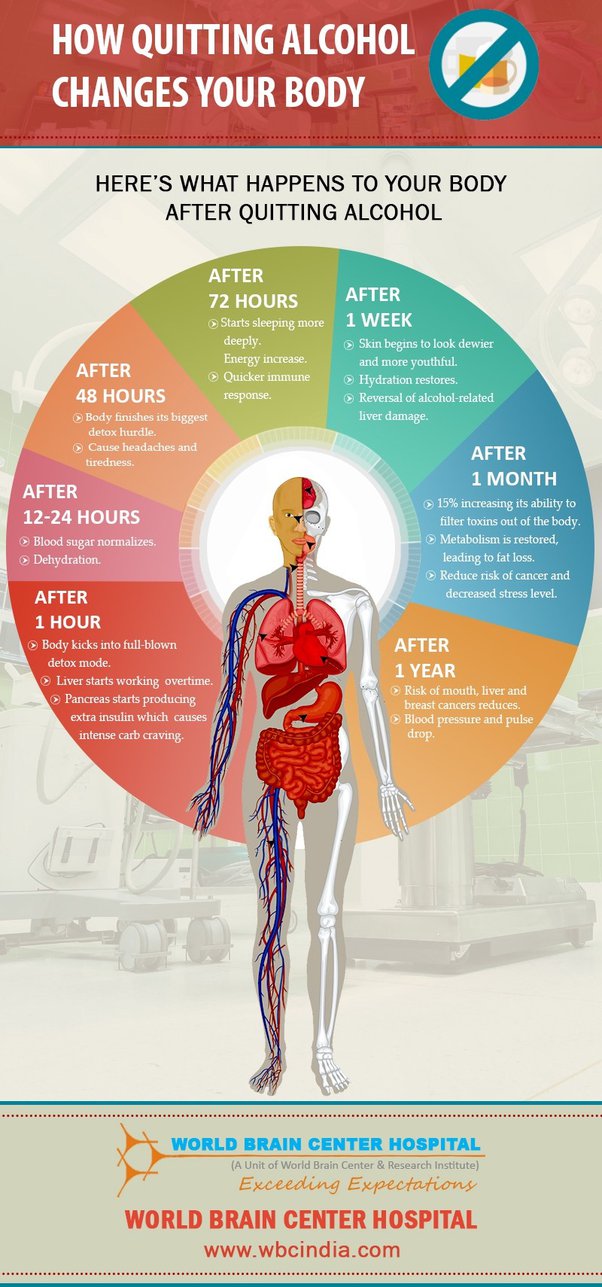
INTERPERSONAL PROBLEM
People with Alcoholism suffer the interpersonal problem. They begin to draw out from family, relatives, and friends. They become argumentative and strained at home, at work, and with friends. Some people won’t even realize how badly they are affecting their family.
>HEALTH PROBLEM
Drinking is done for a short period of time but its effects are long term. It affects our complete body. Heavy drinking puts you at a risk of developing serious health problems.Such as heart disease, liver disease, certain forms of cancer and pancreatitis.
>LIVER DISEASE
Long-term heavy drinking develops alcoholic hepatitis or inflammation of the liver. It causes fever, jaundice and abdominal pain and can cause death.
>HEART DISEASE
Drinking alcohol causes the greatest risk of heart attack, increase blood pressure and heart disease.
>PANCREATITIS
The Pancreas help to regulate the body’s blood sugar. The Pancreas also digest food when we eat. Drinking cause inflammation of the pancreas which causes abdominal pain and weight loss.
OTHER ISSUES
There are many other problems related to drinking. As soon as you recognize it, you will know that you have a problem or the beginnings of a problem. Problems include thinking often about drinking, trying to stop drinking but unable to do, feeling guilty and embarrassed.
After reading these effects of alcoholism you sure want to quit alcohol. Quitting alcohol can be a life-altering decision and when you quit alcohol you will see how your life will improve. Here are the changes in your body when you quit alcohol.
After 1 hour
>Body kicks into full-blown detox mode to clear the alcohol from your body.
>Liver starts working overtime.
>Pancreas starts producing extra insulin which causes intense carb craving.
After 12–24 hours
> Blood sugar normalizes.
> Because of the diuretic effect booze has on bodies, you are going to be Dehydration.
After 48 hours
> Your body finishes its biggest detox hurdle.
> Cause headaches and tiredness.
After 72 hours
> Hangover side effects now out from your body you will start sleeping more deeply.
>Energy will restore.
>Quicker immune response in your body.
After 1 week
>Skin begins to look dewier and more youthful.
>Hydration restores.
>Reversal of alcohol-related liver damage.
After 1 month
>15% increasing its ability to filter toxins out of the body.
>Metabolism will restore leading to fat loss
>Reduce risk of cancer and decreased stress level.
After 1 year
> Risk of mouth, liver and breast cancers reduces.
> Blood pressure and pulse drop.
> Your liver fat will start decreasing.
After quitting alcohol you will feel that your life will improve. These are some reasons to quit alcohol. Though it’s not easy to quit but not impossible. There are many hospitals which provide Alcohol De-addiction services. source
These 7 Body Benefits Will Spur You to Quit Drinking
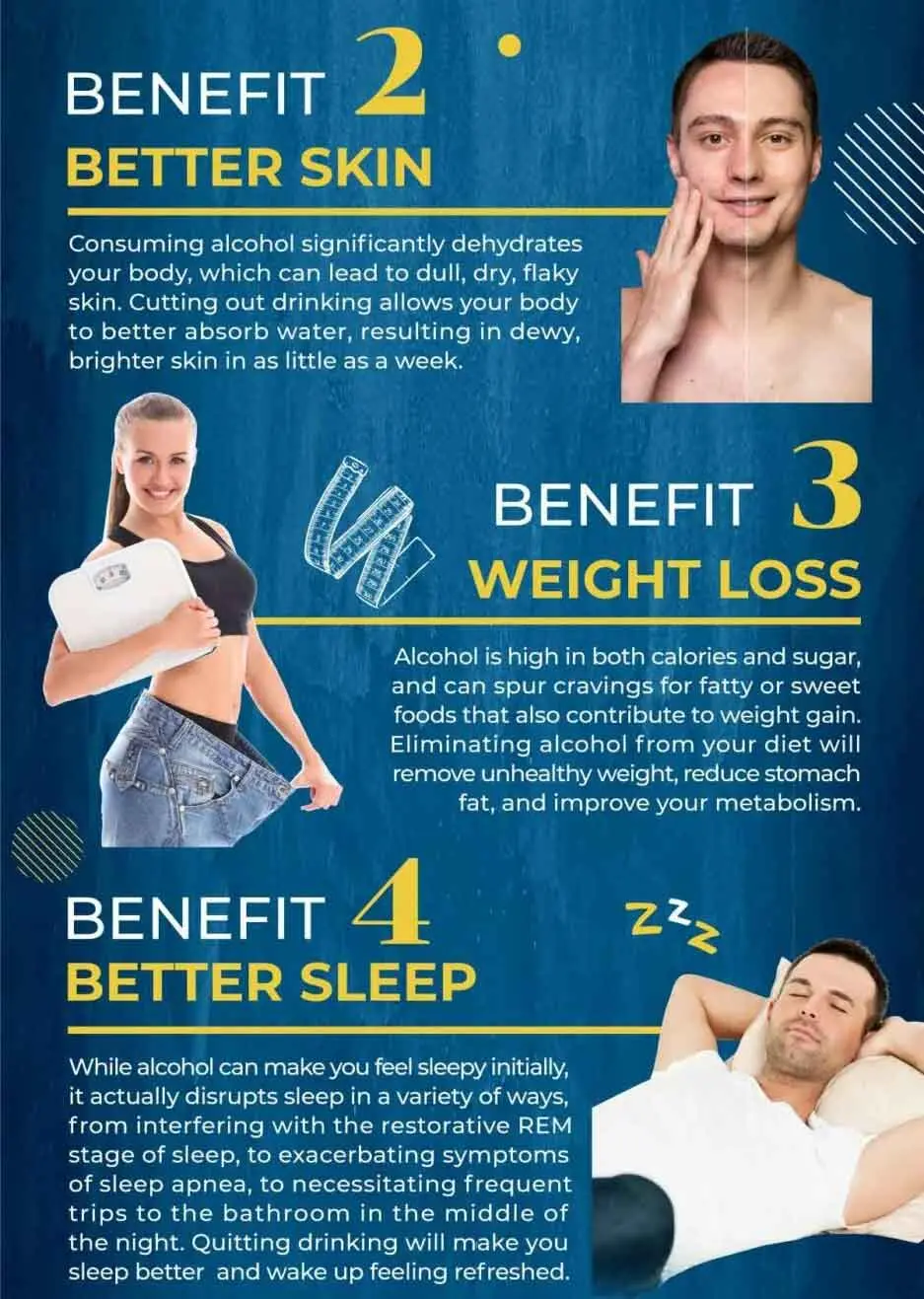
Stopping Drinking Safely: Understanding the Detox Process
If you decide to stop drinking, it is important to remember that it will take some time for your body to physically wean itself away from alcohol. This is because over time, the central nervous system adjusts to the depressive effects of alcohol, which causes the brain to ramp up its response in order for the body to stay functional. In the absence of alcohol, this altered state causes a range of physical responses that make up what we know as withdrawal.
How Long Does it Take to Detox from Alcohol?
For people who have a moderate dependency on alcohol, the first 24 hours of sobriety may be uncomfortable as their bodies detoxify, but after three days generally people begin to feel better. Most people will have completely recovered from the physical symptoms of withdrawal after a month, and are beginning to notice their health returning at this time.
For heavier drinkers, symptoms of withdrawal may be more severe and require medically-supervised detox. Like for moderate drinkers, these symptoms will begin within 24 hours of stopping alcohol use, but generally continue for a longer period of time.
Symptoms of Alcohol Withdrawal
Symptoms of withdrawal can differ based on the severity of the body’s dependency on alcohol, as well as what stage of withdrawal you are in. Generally, symptoms can occur as follows:
- 6 hours after your last drink: Symptoms during this period can feel a lot like a hangover, and may include things like a headache, nausea, sweating, vomiting, shaky hands, anxiety, and insomnia.
- 12-48 hours after your last drink: During this time, more serious problems can develop, including seizures and hallucinations.
- 48-72 hours after your last drink: A small percentage of people will experience deliriums tremens, or DTs, a severe symptom of withdrawal marked by delusions and lifelike hallucinations. This can be accompanied by heavy sweating, fever, elevated blood pressure, confusion, and a racing heartbeat.
If you are unsure of how your body will react to quitting drinking, consider reaching out to an addiction specialist to talk through different detox options and get a sense of what the first phase of recovery may involve. source
Long-term effects of alcohol
Alcohol use can also lead to more lasting concerns that extend beyond your own mood and health.
Some long-term effects of frequently drinking alcohol can include:
- persistent changes in mood, including anxiety and irritability
- insomnia and other sleep concerns
- a weakened immune system, meaning you might get sick more often
- changes in libido and sexual function
- changes in appetite and weight
- problems with memory and concentration
- difficulty focusing on tasks
- increased tension and conflict in romantic and family relationships
Here’s a breakdown of alcohol’s effects on your internal organs and body processes.
Digestive and endocrine glands
Drinking too much alcohol over time may cause inflammation of the pancreas, resulting in pancreatitis. Pancreatitis can activate the release of pancreatic digestive enzymes and cause abdominal pain.
Pancreatitis can become a long-term condition and cause serious complications.
Inflammatory damage
Your liver helps break down and remove toxins and harmful substances (including alcohol) from your body.
Long-term alcohol use interferes with this process. It also increases your risk for alcohol-related liver disease and chronic liver inflammation:
- Alcohol-related liver disease is a potentially life threatening condition that leads to toxins and waste buildup in your body.
- Chronic liver inflammation can cause scarring, or cirrhosis. When scar tissue forms, it may permanently damage your liver.
Sugar levels
The pancreas helps regulate how your body uses insulin and responds to glucose. If your pancreas and liver don’t function properly due to pancreatitis or liver disease, you could experience low blood sugar, or hypoglycemia.
A damaged pancreas can also prevent your body from producing enough insulin to use sugar. This can lead to hyperglycemia, or too much sugar in the blood.
If your body can’t manage and balance your blood sugar levels, you may experience greater complications and side effects related to diabetes.
Experts recommend avoiding excessive amounts of alcohol if you have diabetes or hypoglycemia.
Central nervous system
One major way to recognize alcohol’s impact on your body? Understanding how it affects your central nervous system.
Slurred speech, a key sign of intoxication, happens because alcohol reduces communication between your brain and body. This makes speech and coordination — think reaction time and balance — more difficult. That’s one major reason why you should never drive after drinking.
Over time, alcohol can cause damage to your central nervous system. You might notice numbness and tingling in your feet and hands.
Drinking can also affect your ability to:
- create long-term memories
- think clearly
- make rational choices
- regulate your emotions
Over time, drinking can also damage your frontal lobe, the part of the brain responsible for executive functions, like abstract reasoning, decision making, social behavior, and performance.
Chronic heavy drinking can also cause permanent brain damage, including Wernicke-Korsakoff syndrome, a brain disorder that affects memory.
Digestive system
The connection between alcohol consumption and your digestive system might not seem immediately clear. The side effects often only appear after the damage has happened. Continuing to drink can worsen these symptoms.
Drinking can damage the tissues in your digestive tract, preventing your intestines from digesting food and absorbing nutrients and vitamins properly. In time, this damage can cause malnutrition.
Heavy drinking can also lead to:
- gas
- bloating
- feeling of fullness in your abdomen
- diarrhea or painful stools
- ulcers or hemorrhoids (due to dehydration and constipation)
Ulcers can cause dangerous internal bleeding, which can sometimes be fatal without prompt diagnosis and treatment.
Circulatory system
Chronic drinking can affect your heart and lungs, raising your risk of developing heart-related health issues.
Circulatory system complications include:
- high blood pressure
- irregular heartbeat
- difficulty pumping blood through the body
- stroke
- heart attack
- heart disease
- heart failure
Difficulty absorbing vitamins and minerals from food can cause fatigue and anemia, a condition where you have a low red blood cell count.
Sexual and reproductive health
Drinking alcohol can lower your inhibitions, so you might assume alcohol can ramp up your fun in the bedroom.
In reality, though, heavy drinking can:
- prevent sex hormone production
- lower your libido
- keep you from getting or maintaining an erection
- make it difficult to achieve orgasm
Excessive drinking may affect your menstrual cycle and potentially increase your risk for infertility.
Alcohol use during pregnancy
No amountTrusted Source of alcohol is considered safe for pregnant people.
That’s because drinking during pregnancy doesn’t just affect your health. It can lead to miscarriage, stillbirth, or premature delivery.
Children exposed to alcohol in the womb may experience a range of complications after birth, including:
- learning difficulties
- long-term health issues
- increased emotional problems
- developmental concerns
Skeletal and muscle systems
Long-term alcohol use can affect bone density, leading to thinner bones and increasing your risk of fractures if you fall. Weakened bones may also heal slower.
Drinking alcohol can also lead to muscle weakness, cramping, and eventually atrophy.
Immune system
Drinking heavily reduces your body’s natural immune system. A weakened immune system has a harder time protecting you from germs and viruses.
People who drink heavily over a long period of time are also more likely to develop pneumonia or tuberculosis than the general population. The World Health Organization (WHO) links about 8.1 percentTrusted Source of all tuberculosis cases worldwide to alcohol consumption.
Drinking alcohol can also factor intoTrusted Source your cancer risk:
- Frequent drinking can increase your risk of developing mouth, throat, breast, esophagus, colon, or liver cancer.
- Drinking and using tobacco together can further increase your riskTrusted Source of developing mouth or throat cancer.
Psychological effects
Long-term alcohol use can lead to changes in your brain that can affect your:
- memory and concentration
- impulse control
- emotions, mood, and personality
Regular drinking can also affect overall mental health and well-being, in part because alcohol may worsen symptoms of certain mental health conditions, including anxiety, depression, and bipolar disorder.
You might also notice feelings of anxiety with a hangover.
Alcohol-induced mental health conditions
Alcohol use can factor into mental health symptoms that closely resemble those of other mental health conditions.
The latest edition of The Diagnostic and Statistical Manual of Mental Disorders (DSM-5), which mental health professionals use to diagnose mental health conditions, includes diagnostic criteria for:
- alcohol-induced bipolar disorder
- alcohol-induced psychotic disorder
- alcohol-induced sleep disorder
- alcohol-induced depressive disorder
- alcohol-induced anxiety disorder
With these conditions, you’ll only notice symptoms during alcohol intoxication or withdrawal. These symptoms typically improve quickly when alcohol use stops.
Dependence
Some people who drink eventually develop a tolerance to alcohol. As a result, they eventually need to drink more to notice the same effects they once did.
Drinking alcohol on a regular basis can also lead to dependence, which means your body and brain have grown used to alcohol’s effects.
When you stop drinking, you might notice a range of physical, emotional, or mental health symptoms that ease as soon as you have a drink.
Tolerance and dependence can both happen as symptoms of alcohol use disorder, a mental health condition previously referred to as alcoholism, that happens when your body becomes dependent on alcohol. This condition can be mild, moderate, or severe, depending on the number of symptoms you have.
Key symptoms may include:
- cravings
- withdrawal
- drinking more over time
- having difficulty stopping after one drink
- inability to stop drinking when you try
- continuing to drink alcohol even when it has a negative impact on your health or daily life
- spending a lot of time on activities related to alcohol use
Learn more about the signs of alcohol use disorder.
Alcohol withdrawal
Alcohol withdrawal can be difficult and, in some cases, life threatening. Depending on how often you drink and how much, you may need support from a healthcare professional if you want to stop drinking.
It’s always best to connect with your doctor before quitting alcohol. The “cold turkey” approach might not always be safe.
Symptoms of alcohol withdrawal include:
- anxiety
- nervousness
- nausea
- tremors
- high blood pressure
- irregular heartbeat
- heavy sweating
Seizures, hallucinations, and delirium may occur in severe cases of withdrawal.
Medical detoxification can help you stop drinking safely. Your doctor may recommend treatment at a clinic or at home, depending on your risk for withdrawal symptoms.
Certain factors may increase your chances of experiencing alcohol use disorder.
Some of these include:
- heavy drinking
- binge drinking
- ongoing stress
- having peers or family members who drink a lot of alcohol
- having genes that affect your sensitivity to alcohol
- having anxiety, depression, schizophrenia, or another mental health condition
- having a close relative, especially a parent, with the condition
3 Ways Your Appearance Changes When You Quit Drinking

Alcoholism can ravage all aspects of your life, altering your behavior, damaging your relationships, wrecking your health, and destroying your self-esteem. Over time, the toll of alcoholism can leave you feeling and looking different from the person you want to be. You will see many beneficial appearance changes after you quit drinking, including in the mirror.
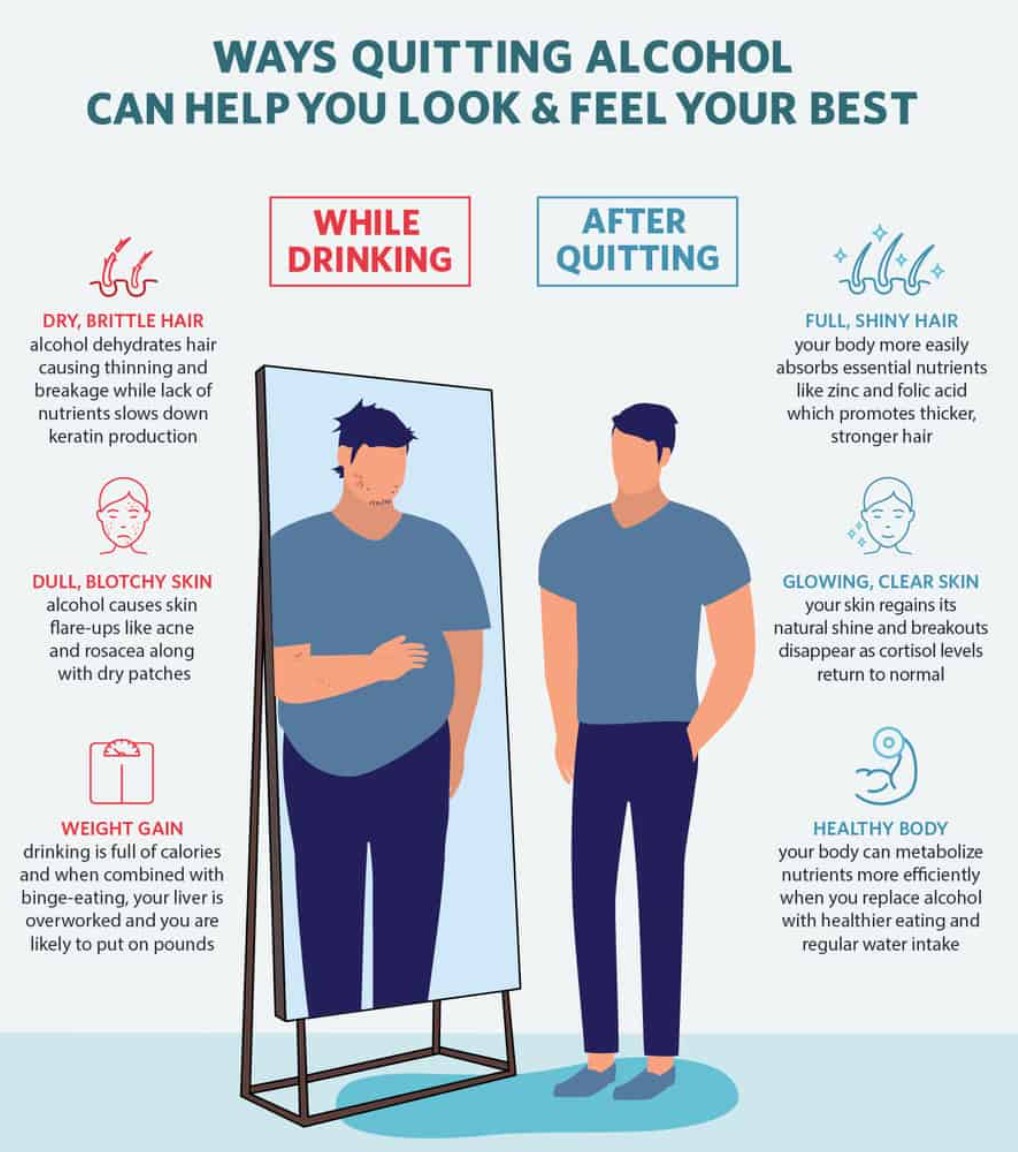
Negative Effects of Alcohol
-
Physical healthAlcohol can cause chronic diseases like heart disease, stroke, liver disease, and digestive problems. It can also damage your heart, causing problems like cardiomyopathy, arrhythmias, and high blood pressure. Heavy drinking can lead to liver inflammations, including fatty liver, alcoholic hepatitis, fibrosis, and cirrhosis.
-
Mental healthAlcohol can cause depression, anxiety, and other mental health problems. It can also weaken your immune system, making you more vulnerable to serious infections.
-
Cognitive healthAlcohol can cause learning and memory problems, including dementia and poor school performance. It can also damage the brain, which can lead to problems with thinking and memory.
-
Other health problemsAlcohol can cause cancer of the breast, mouth, throat, esophagus, voice box, liver, colon, and rectum. It can also cause diabetes, nutrition-related conditions, and overweight and obesity.
Short-Term Health Risks
Excessive alcohol use has immediate effects that increase the risk of many harmful health conditions. These are most often the result of binge drinking and include the following:
- Injuries, such as motor vehicle crashes, falls, drownings, and burns.6,7
- Violence, including homicide, suicide, sexual assault, and intimate partner violence.6-10
- Alcohol poisoning, a medical emergency that results from high blood alcohol levels.11
- Risky sexual behaviors, including unprotected sex or sex with multiple partners. These behaviors can result in unintended pregnancy or sexually transmitted diseases, including HIV.12,13
- Miscarriage and stillbirth or fetal alcohol spectrum disorders (FASDs) among pregnant women.6,12,14,15
Long-Term Health Risks
Over time, excessive alcohol use can lead to the development of chronic diseases and other serious problems including:
- High blood pressure, heart disease, stroke, liver disease, and digestive problems.6,16
- Cancer of the breast, mouth, throat, esophagus, voice box, liver, colon, and rectum.6,17
- Weakening of the immune system, increasing the chances of getting sick.6,16
- Learning and memory problems, including dementia and poor school performance.6,18
- Mental health problems, including depression and anxiety.6,19
- Social problems, including family problems, job-related problems, and unemployment.6,20,21
- Alcohol use disorders, or alcohol dependence.5
By quitting drinking, you can reduce the risk of these short- and long-term health risks. source
Below are three ways quitting alcohol can help you look (and feel) your best.
1. You Will Lose Weight
While Drinking: Consuming alcohol in excess can significantly impact someone’s body shape. For starters, alcohol is very high in calories. There are seven calories in every gram of alcohol; for context, protein holds four calories per gram and fat has nine calories per gram. In addition, drinking alcohol activates the brain cells in the hypothalamus that make people feel hungry. This is the reason why after a night of drinking people tend to have the munchies. Lots of drinks plus extra eating equals a lot more calories than your body needs.
Alcohol also makes it more difficult for your body to burn any foods you eat. The body flags alcohol as a toxin, and the liver focuses on breaking down alcohol before any fat, carbohydrate, or protein. When the liver is constantly working to process alcohol rather than food, you start to gain weight. In the case of heavy drinkers, alcohol can cause so much damage to the liver that it stops functioning properly, which can lead to deadly conditions such as fatty liver disease or cirrhosis.
After Quitting: Weight loss happens during sobriety when someone replaces their old habits with new ones: sticking to healthier meals, no longer binge eating extra food while drinking, and, of course, no longer drinking all those empty calories. After quitting alcohol, your body can once again focus on metabolizing nutrients.
2. Your Skin Will Glow
While Drinking: When you are struggling with alcoholism, your skin is probably the least of your concerns. But the effects of drinking may be more serious than you think. Alcohol is a diuretic, which means that it causes more water to be processed through the kidneys. This leaves you dehydrated and causes dry patches, dull skin, fine lines, and dark under-eye circles. Your skin may become sensitive to the touch and feel uncomfortable, even itchy.
Chronic alcohol consumption also elevates the level of the stress hormone cortisol in the body, triggering alcohol-related premature aging. This stress can break down the skin’s collagen and cause inflammation, leading to wrinkles. Cortisol can also aggravate other skin conditions like rosacea or acne, causing flareups and breakouts.
After Quitting: By replacing alcoholic drinks with plenty of water, you are allowing your skin to rehydrate and flush out toxins through urine and sweat. Your skin will regain its natural, healthy glow as you replenish the necessary vitamins and minerals lost from active addiction.
3. Your Hair Will Grow
While Drinking: When alcohol dehydrates your body, it also dehydrates your hair. The lack of moisture causes thinning, hair loss, and dandruff on the scalp. Hair shedding is compounded by alcohol triggering increased production of cortisol and the hormone estrogen.
Alcohol also inhibits nutrient absorption by harming the lining of your digestive system over time, damaging your intestines until they can’t transfer nutrients to the blood. Without proper protein, the production of keratin slows; this protective agent bonds hair cells together and your hair becomes prone to split ends and breakage. Similarly, zinc and folic acid, which are essential for hair growth, aren’t soaked up by your follicles.
After Quitting: Your hair will regain its former strength as your body begins to repair itself from the effects of alcohol. The rate your hair grows will increase, and you’ll notice the change from hair loss to fuller, shinier locks.
Leaving alcohol behind and pursuing sobriety brings favorable changes to your appearance that you might not have anticipated. As you start to look good, you’ll feel good about yourself, and when you look in the mirror, you’ll see the old you again. source
‘I Gave Up Alcohol a Year Ago—I Feel 10 Years Younger’
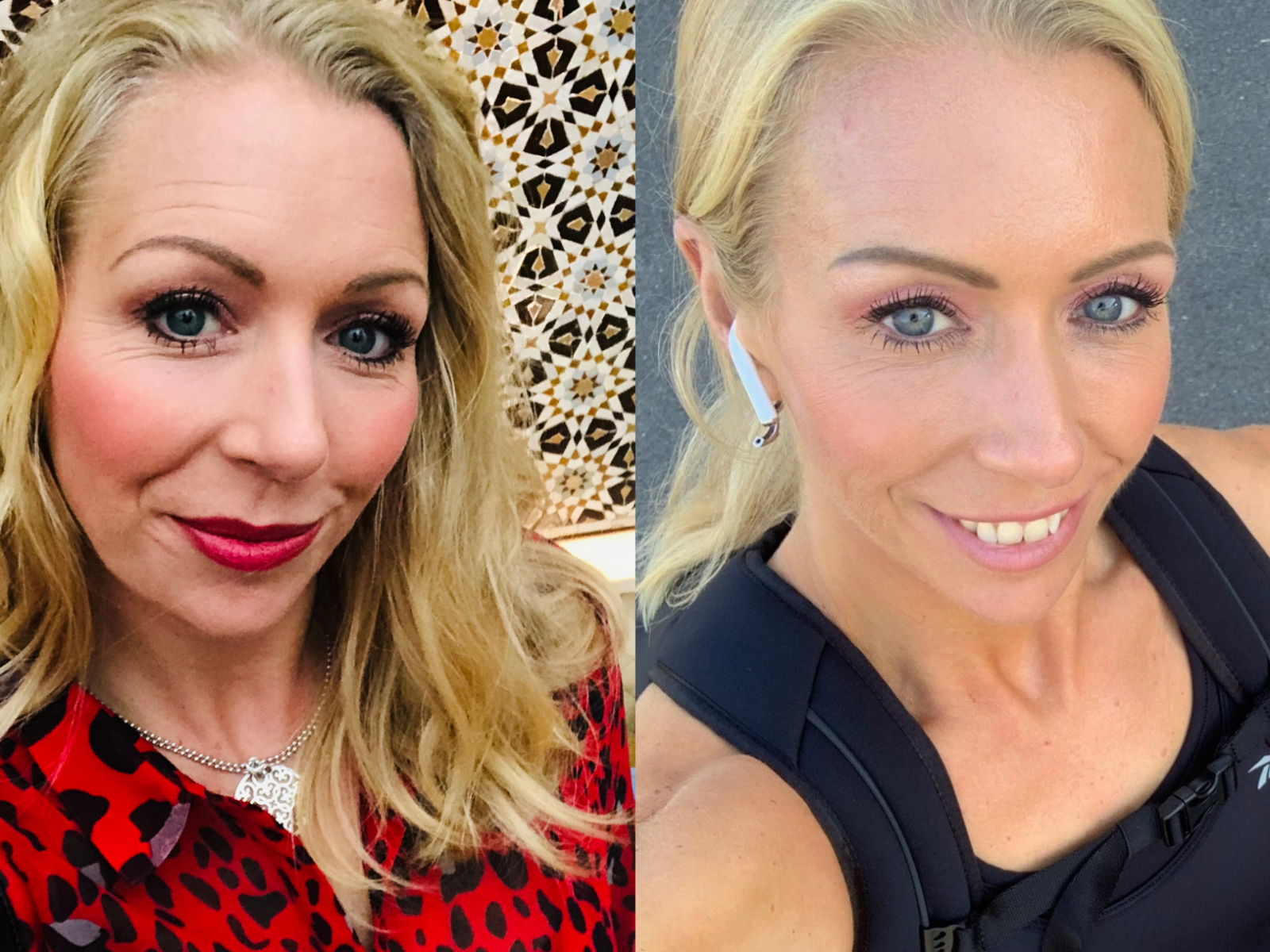
I come from a family of drinkers so I grew up around alcohol. Whether we were celebrating or commiserating, alcohol was always involved. My paternal grandfather was actually born in a pub and named after it.
Sometimes I would buy wine in a box, decant it into a litre sized water bottle in the garage or bathroom and slug that down quickly. My behaviour became erratic and I wasn’t able to meet my commitments at work. When I was drunk, I would look in the mirror and say, “How did I get like this?” and then the next might I would be drunk again.
I was also an emotional wreck. I had trouble relating to my family and I would get angry very easily. I was irritable, restless and I didn’t sleep well. I got to a point where I knew that if I didn’t reach out for help, I would be a dead man.
On November 2, 2016, I had a week of vacation starting and I bought myself a case of 24 beers. I was going to ration them out and have three or four beers a night. I put my son to bed at 8pm and cracked open my first beer. By 11pm I had finished 19 of them. Something inside of me said: “Kenny, your life is no longer manageable.” It was true.
I reached out to a friend of mine who I knew was in recovery from alcoholism, something I had never done before. The next morning she took me to a meeting for addicts. I knew I was home amongst those people because each of them told a story that could have been mine. I finally realized then: I’m an alcoholic.
In the 12 Step program I learned that stopping on my own is not something that I have the physical or emotional capability of doing. That program worked for me, but if something else works for other people, that’s great. There are many ways to get sober and 12 Step is just one of them. However, it was foolish of me to stop drinking on my own without consulting a doctor.
In that first week I had to call a complete stranger, someone who had been through the program, and ask them to be my sponsor. That was hell. But that guy told me to call him and go to a meeting every day. When I said that was too much, I remember he replied, “well, you drank every day.” I had no rebuttal.
For the first 30 days I was on what is called the “pink cloud.” I was very happy; it was like coming out of a bad relationship. The “pink cloud” ended when my sponsor said that I had to clean up the mess I had made of my life and all the people that I had harmed. That was when it got difficult and I started having doubts about recovery. You have to address what led you down the path to wanting to alter your state in the first place. I just wanted my life back, but instead I was encouraged to fix the old one.
It took me about 10 months to get through all 12 Steps and eventually I chose to put my trust in a higher power, something I was taught by the program, though it doesn’t have to be God.
I realized that I had been angry about many things in my life, all the way from childhood. Part of the program is recognizing that and letting it go. Then you have to make a list of all the people that you’ve harmed and make amends to them. It’s not just apologizing, you actually have to mend the situation.
When I was drinking I would go onto social media every night and lash out at people. I was angry, spiteful and resentful to my friends and peers, and sometimes strangers. I had a lot of situations that I needed to make right.
I had also stolen from people and I had to pay them back. That was hard. I’m a family man so it was difficult for me to accept that I had stolen whilst under the influence of alcohol, or in order to become under the influence of alcohol.
So, life as a sober person was very difficult at the beginning. Although my wife doesn’t drink, I couldn’t go to places where alcohol was served and I became a bit of an introvert. At our family Christmas in 2016, I noticed there was no alcohol and a few hours in I asked my father why they weren’t drinking. He told me not to worry. I realized my family had collectively decided to abstain from alcohol for my sake. It was very emotional and it absolutely meant the world to me. Now, I don’t have an issue being around alcohol, but it was hard for a while. source


